

Post-scarcity economy. This would require a sophisticated system of resource recycling, in conjunction with advanced productive technology that enables conditions of material abundance, such as automated systems capable of converting raw materials into finished goods[not verified in body], which in turn enable the free distribution[2] of most or all economic output and the common ownership of the means of production used therefor.
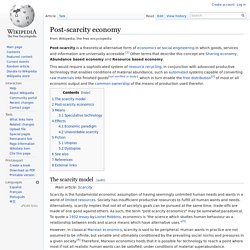
The scarcity model[edit] Scarcity is the fundamental economic assumption of having seemingly unlimited human needs and wants in a world of limited resources. Society has insufficient productive resources to fulfill all human wants and needs. Alternatively, scarcity implies that not all of society's goals can be pursued at the same time; trade-offs are made of one good against others.
As such, the term "post-scarcity economics" may be somewhat paradoxical. However, in classical Marxian economics, scarcity is said to be peripheral. Resource Based Economic Model. VIAAC.
Equality. Shared Resources. Shared Allocation. Products as Services. Open Design. Priority Theory of Value. Transition. Direct Resource Management. Examples. Inventory. Agriculture. Energy Use. Transition. Aspects of a Natural Economy. I still feel much of what I’ve written is not accessible to the general public.
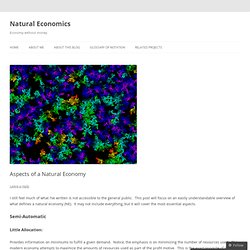
This post will focus on an easily understandable overview of what defines a natural economy (NE). It may not include everything, but it will cover the most essential aspects. Semi-Automatic Little Allocation: Provides information on minimums to fulfill a given demand. Rockström Restriction: Rigorous constraints to prevent over-exploitation (using resources faster than they can be replenished). Voluntary (but not free-for-all): The luxuries produced are chosen by people, but assistance is provided on intelligent provision, and overexploitation is prevented. Pre-emption and Prioritization: Products are assigned priorities to deal with trade-offs. Inclusive: A natural economy recognizes that no one should be condemned. Provision for all: All people will be provided the necessities of life. Communitization: Sharing means there is more for everyone.
Fundamentals of Natural Economics. If you are unfamiliar with the basics of calculus, you can get a brief lesson here.
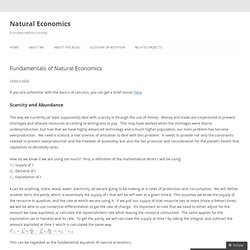
Scarcity and Abundance The way we currently (at least supposedly) deal with scarcity is through the use of money. Money and trade are conjectured to prevent shortages and allocate resources according to willingness to pay. This may have worked when the shortages were due to underproduction, but now that we have highly advanced technology and a much higher population, our main problem has become overproduction. We need a science, a real science, of allocation to deal with this problem.
Fundamentals, Continued. If you’ve been following, you may have noticed that though I defined three basic parameters, S, E, and D, I only used two of them.
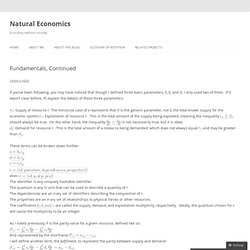
If it wasn’t clear before, I’ll explain the details of these three parameters: : Supply of resource r. The miniscule case of s represents that it is the generic parameter, not S, the total known supply for the economic system. : Exploitation of resource r. This is the total amount of the supply being exploited, meaning the inequality should always be true. Is not necessarily true, but it is ideal. : Demand for resource r. And may be greater than These terms can be broken down further: alias: The identifier is any uniquely hashable identifier. Appropedia. Reliable Prosperity. Appropriate Technology — ECHO. Biogas digesters using manure, food scraps, and/or plant residues to create methane gas which can be used for cooking, and the digester also creates a high quality compost to be used for agriculture.
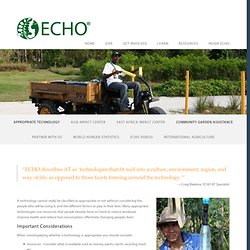
Improved Cookstoves can be very simply made clay or metal structures which can improve the efficiency of burning solid fuels for cooking and reduce the possibility of smoke inhalation and related diseases. Household water filters can be purchased or constructed from local materials and used for treating dirty, contaminated water to make it safe for drinking. This reduces the number of water-borne diseases which is a leading cause of death in developing countries. ECHO is using AT at the Global Demonstration Farm in Florida for processing and preserving the crops we grow, to improve our soil, feed our animals through the dry season, and generate renewable energy. ECHO does this as part of our responsibility as stewards of creation, but also as part of our responsibility to serve others.